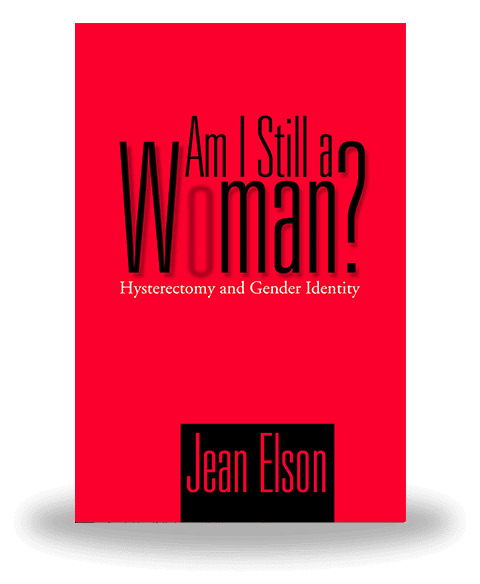Am I Still a Woman? Hysterectomy and Gender Identity
By: Dr. Jean Elson

Recent cultural debates bring renewed attention to the relationship between women's bodies and gender identity. In Am I Still A Woman? Dr. Jean Elson offers the testimony of women who have thought deeply about this issue as a result of gynecological surgery.
For the women in this book, gynecological surgery for benign conditions proved to be a crisis that prompted questions about the meanings of sexual and reproductive organs in relation to being female and feminine. Is a woman who no longer menstruates still a woman? What about a woman who can no longer bear children? Elson looks closely at the differences in responses to understand the impact of surgery and lost fertility on sexuality and partnerships as well as the steps some women take to deal with a sense of a stigmatized identity. Whether they reconceptualized their old notions of what it means to be a woman or put a new focus on making themselves attractive, they made conscious efforts to reclaim their female identity and femininity. This book provides a wealth of insight into the choices women make regarding gynecological surgery and maintaining their sense of themselves as women.
From Page 2:
The uterus is the womb, which contains and nourishes a fetus during gestation. Most biologically female people also have two ovaries, which produce ova (eggs) and sex hormones. [Ovaries are the female gonads, just as the testicles are the male gonads]. The usual nonpregnant human uterus weighs only approximately two ounces and is merely three inches long: the ovaries are even tinier, only one inch by one and a half inches. However, these sexual/reproductive organs carry great cultural and personal significance.
Most [cis] women do not consider the meanings of their uteruses and ovaries until they are faced with a crisis…In this book I explore the experiences of forty-four American [cis] women who have undergone hysterectomy (surgical removal of the uterus) with or without oophorectomy (surgical removal of the ovary) for benign conditions. Hysterectomy and oophorectomy offer [cis] women a unique opportunity to contemplate the meaning of their sexual reproductive organs in the context of female (and feminine) identity.
I explore how - whether they perceived loss, stability or enhancement—respondents dealt with possible contradictions in gender identity presented by absent sexual reproductive organs.
From Pages 27-28:
…Do respondents feel that surgical removal of their uteruses and/or ovaries has disrupted their gender identities to the extent that they are no longer women? Do they believe that they are still women due to a deeply innate essence? Do respondents maintain that they are still women because they perform feminine roles or appear outwardly feminine? Since for humans the social and biological are inseparable, decisions regarding identity are too complex to offer simplistic answers to these questions. Nevertheless, by paying close attention to respondents’ experiences, I examined their nuanced understanding of the impact of surgery on their very personal perceptions of gender identity.
Some of the analytic messiness attached to my study stems from the contingency that respondents did not self-consciously seek gender identity transformations through surgery. This represents a very different situation from other sociological studies that examine the impact of surgery on gender identity. For example, individuals who undergo transsexual surgery read, talk and think about the meanings of sex, sexuality and gender before surgery. The vast majority of the [cis] women I interviewed were not theoretically sophisticated regarding sex and gender. Hysterectomy and oophorectomy were not chosen as the means to achieve new, altered gender identities, and, with few exceptions, prior to surgery they did not even have the opportunity to consider the meaning of either their sexual reproductive organs or their gender identity… Respondents’ discussions of their surgery experiences help problematize the association of organs with gender identity, opening possibilities for re-theorizing essentialist, socialization, and social constructionist theories of sex and gender.
From Pages 171-173:
… It is tempting to demand that the data produce a definitive answer to a specific question: Does gynecological surgery produce a change in gender identity? Nevertheless, I have made it clear from the beginning that I did not approach this research with the expectation that respondents who had widely differing social backgrounds and experiences would react in similar ways simply because they underwent the same medical procedures. My findings confirm that some women believe that their bodies and lives have been greatly changed by surgery, others sense very little change, and some perceive no change at all. Certain categories of [cis] women were more likely to suffer disrupted gender identity than others. The one consistent factor for all forty-four respondents was that gynecological surgery was a reason for reflection about gender identity… For most respondents, the answer to the question “Am I still a woman?” was not as simple as a “yes” or “no. These [cis] women had more nuanced understandings of the effect of gynecological surgery on their own gender identities.